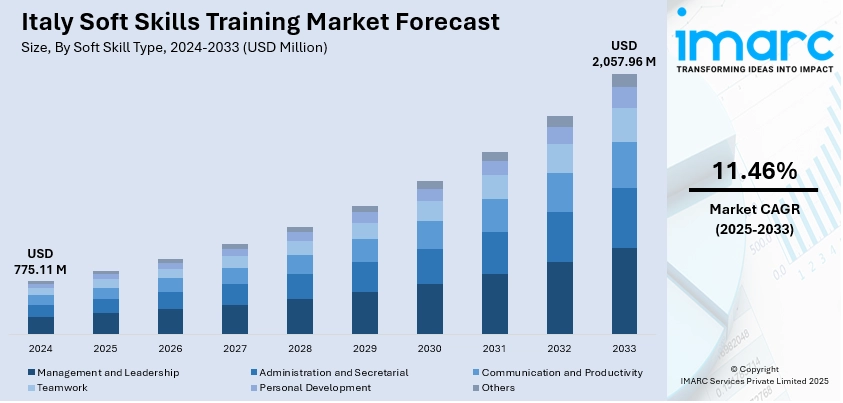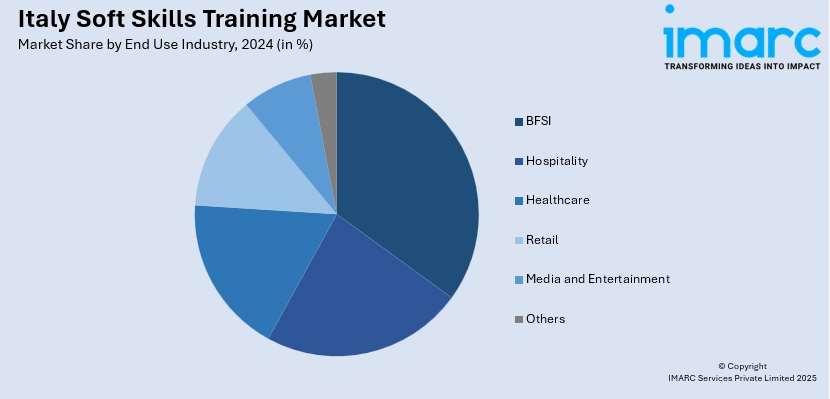
Italy Soft Skills Training Market Size, Share, Trends and Forecast by Soft Skill Type, Channel Provider, Sourcing, Delivery Mode, End Use Industry, and Region, 2025-2033
Italy Soft Skills Training Market Overview:
The Italy soft skills training market size reached USD 775.11 Million in 2024. The market is projected to reach USD 2,057.96 Million by 2033, exhibiting a growth rate (CAGR) of 11.46% during 2025-2033. At present, the growing focus on holistic student development and preparing graduates for the evolving demands of the job market is creating the need for soft skills training programs. In addition, increasing utilization of artificial intelligence (AI) is contributing to the expansion of the Italy soft skills training market share.
|
Report Attribute
|
Key Statistics
|
|---|---|
|
Base Year
|
2024
|
|
Forecast Years
|
2025-2033
|
|
Historical Years
|
2019-2024
|
| Market Size in 2024 | USD 775.11 Million |
| Market Forecast in 2033 | USD 2,057.96 Million |
| Market Growth Rate 2025-2033 | 11.46% |
Italy Soft Skills Training Market Trends:
Expansion of the education sector
The expansion of the education sector is fueling the market growth in Italy. As educational institutions across Italy are modernizing their curricula, there is a rising emphasis on equipping students with soft skills, such as communication, teamwork, adaptability, leadership, and critical thinking. With increasing student enrollments, universities, colleges, and vocational institutions are integrating soft skills modules into their programs to improve students' employability and readiness for real-world work environments. According to the information provided on the official website of the European Commission, during the 2023-2024 academic year, Italy’s public educational institutions registered 7,194,400 learners. This shift is also encouraged by employers who seek candidates with not just technical knowledge but also strong interpersonal and problem-solving abilities. Educational reforms and collaborations with industry partners are further promoting the inclusion of soft skills training in academic settings. Moreover, teachers and academic staff themselves undergo soft skills training to better engage students, manage classrooms, and foster a more collaborative learning environment. As the education sector is expanding to serve a more diverse and competitive student base, the demand for structured and professional soft skills training is growing across different age groups and educational levels.

To get more information on this market, Request Sample
Growing adoption of remote and hybrid work arrangements
Rising adoption of remote and hybrid work arrangements is impelling the Italy soft skills training market growth. The research carried out by the Osservatorio revealed that the count of remote workers in 2024 reached 3.55 Million in Italy. As teams are operating across different locations, effective digital communication and the ability to work independently are becoming essential for maintaining productivity and cohesion. Employers in Italy are recognizing that remote work requires greater emotional intelligence, adaptability, and time management, leading them to invest in training programs that build these competencies. Virtual teamwork, conflict resolution, and leadership in digital environments are also in high demand as managers lead dispersed teams. Training providers offer flexible, online modules that suit the hybrid work culture, helping employees develop interpersonal and organizational skills relevant to virtual settings. This shift in work style is encouraging both individuals and organizations to prioritize soft skills as critical for long-term success.
Increasing utilization of AI
Rising use of AI is positively influencing the market. According to industry reports, the Italy AI market value reached €909 Million in 2024, increasing by 34.8% from 2023. As AI takes over routine and analytical tasks, employers prioritize soft skills that machines cannot replicate. Italian organizations are allocating resources to training initiatives that assist employees in adjusting to evolving job demands and staying competitive in a tech-oriented landscape. AI also supports the delivery of soft skills training through personalized learning paths, real-time feedback, and interactive simulations. Virtual coaching tools powered by AI assist individuals in building confidence in communication and decision-making. Additionally, AI enables human resource (HR) teams to identify skill gaps and measure training outcomes more effectively.
Italy Soft Skills Training Market Segmentation:
IMARC Group provides an analysis of the key trends in each segment of the market, along with forecasts at the country and regional levels for 2025-2033. Our report has categorized the market based on soft skill type, channel provider, sourcing, delivery mode, and end use industry.
Soft Skill Type Insights:
- Management and Leadership
- Administration and Secretarial
- Communication and Productivity
- Teamwork
- Personal Development
- Others
The report has provided a detailed breakup and analysis of the market based on the soft skill type. This includes management and leadership, administration and secretarial, communication and productivity, teamwork, personal development, and others.
Channel Provider Insights:
- Corporate/Enterprise
- Academic/Education
- Government
A detailed breakup and analysis of the market based on the channel provider have also been provided in the report. This includes corporate/enterprise, academic/education, and government.
Sourcing Insights:
- In-house
- Outsourced
A detailed breakup and analysis of the market based on the sourcing have also been provided in the report. This includes in-house and outsourced.
Delivery Mode Insights:
- Online
- Offline
A detailed breakup and analysis of the market based on the delivery mode have also been provided in the report. This includes online and offline.
End Use Industry Insights:

- BFSI
- Hospitality
- Healthcare
- Retail
- Media and Entertainment
- Others
A detailed breakup and analysis of the market based on the end use industry have also been provided in the report. This includes BFSI, hospitality, healthcare, retail, media and entertainment, and others.
Regional Insights:
- Northwest
- Northeast
- Central
- South
- Others
The report has also provided a comprehensive analysis of all the major regional markets, which include Northwest, Northeast, Central, South, and others.
Competitive Landscape:
The market research report has also provided a comprehensive analysis of the competitive landscape. Competitive analysis such as market structure, key player positioning, top winning strategies, competitive dashboard, and company evaluation quadrant has been covered in the report. Also, detailed profiles of all major companies have been provided.
Italy Soft Skills Training Market Report Coverage:
| Report Features | Details |
|---|---|
| Base Year of the Analysis | 2024 |
| Historical Period | 2019-2024 |
| Forecast Period | 2025-2033 |
| Units | Million USD |
| Scope of the Report |
Exploration of Historical Trends and Market Outlook, Industry Catalysts and Challenges, Segment-Wise Historical and Future Market Assessment:
|
| Soft Skill Types Covered | Management and Leadership, Administration and Secretarial, Communication and Productivity, Teamwork, Personal Development, Others |
| Channel Providers Covered | Corporate/ Enterprise, Academic/ Education, Government |
| Sourcings Covered | In-house, Outsourced |
| Delivery Modes Covered | Online, Offline |
| End Use Industries Covered | BFSI, Hospitality, Healthcare, Retail, Media and Entertainment, Others |
| Regions Covered | Northwest, Northeast, Central, South, Others |
| Customization Scope | 10% Free Customization |
| Post-Sale Analyst Support | 10-12 Weeks |
| Delivery Format | PDF and Excel through Email (We can also provide the editable version of the report in PPT/Word format on special request) |
Key Questions Answered in This Report:
- How has the Italy soft skills training market performed so far and how will it perform in the coming years?
- What is the breakup of the Italy soft skills training market on the basis of soft skill type?
- What is the breakup of the Italy soft skills training market on the basis of channel provider?
- What is the breakup of the Italy soft skills training market on the basis of sourcing?
- What is the breakup of the Italy soft skills training market on the basis of delivery mode?
- What is the breakup of the Italy soft skills training market on the basis of end use industry?
- What is the breakup of the Italy soft skills training market on the basis of region?
- What are the various stages in the value chain of the Italy soft skills training market?
- What are the key driving factors and challenges in the Italy soft skills training market?
- What is the structure of the Italy soft skills training market and who are the key players?
- What is the degree of competition in the Italy soft skills training market?
Key Benefits for Stakeholders:
- IMARC’s industry report offers a comprehensive quantitative analysis of various market segments, historical and current market trends, market forecasts, and dynamics of the Italy soft skills training market from 2019-2033.
- The research report provides the latest information on the market drivers, challenges, and opportunities in the Italy soft skills training market.
- Porter's five forces analysis assist stakeholders in assessing the impact of new entrants, competitive rivalry, supplier power, buyer power, and the threat of substitution. It helps stakeholders to analyze the level of competition within the Italy soft skills training industry and its attractiveness.
- Competitive landscape allows stakeholders to understand their competitive environment and provides an insight into the current positions of key players in the market.
Need more help?
- Speak to our experienced analysts for insights on the current market scenarios.
- Include additional segments and countries to customize the report as per your requirement.
- Gain an unparalleled competitive advantage in your domain by understanding how to utilize the report and positively impacting your operations and revenue.
- For further assistance, please connect with our analysts.
 Request Customization
Request Customization
 Speak to an Analyst
Speak to an Analyst
 Request Brochure
Request Brochure
 Inquire Before Buying
Inquire Before Buying




.webp)




.webp)












